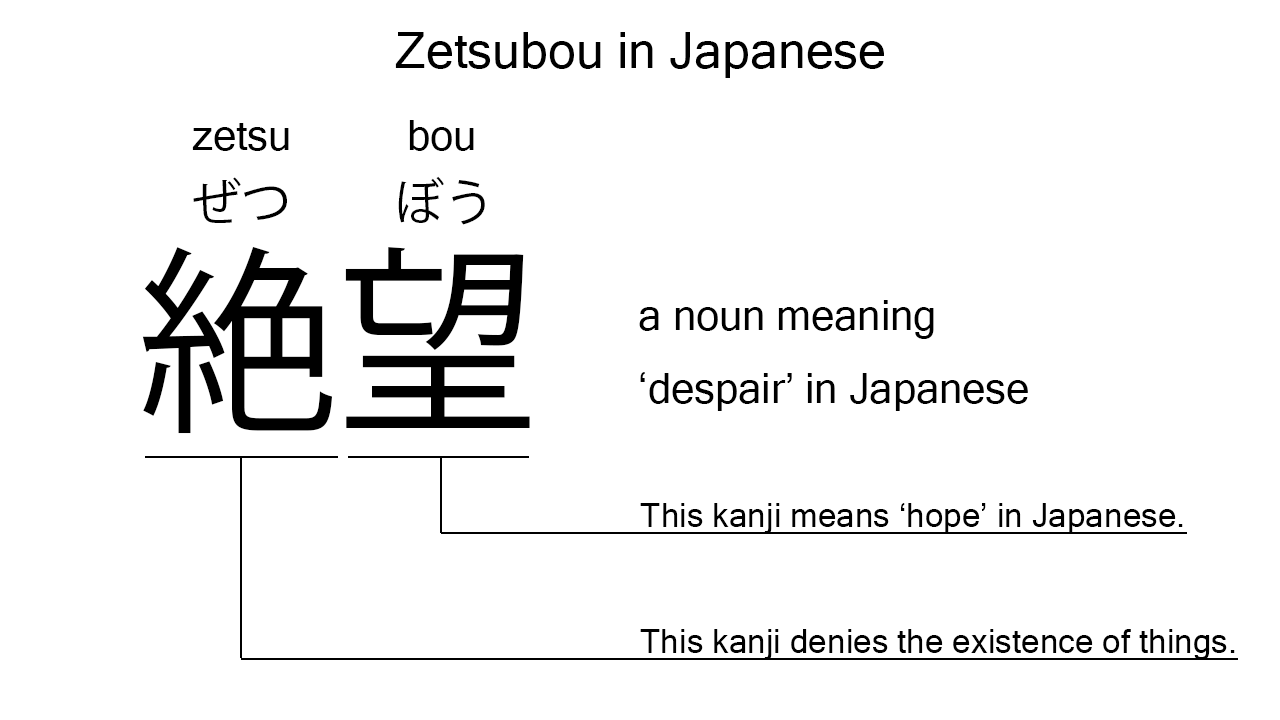What does “zetsubou” mean in Japanese?
Native speakers say “zetsubou” to mean ‘despair’ in Japanese. Perhaps, some Japanese learners know this word as it is sometimes used in Japanese movies, songs, novels, manga, anime, and the like. In this blog post, however, I will explain this word in detail based on its kanji expression. And also, I will explain how to use it through example sentences. My explanations would help Japanese learners understand “zetsubou” more clearly. Then, let’s get started!
Contents
Definition and meaning of “zetsubou”
Let me start with the definition and meaning of “zetsubou”.
- zetsubou – 絶望 (ぜつぼう) : a noun meaning ‘despair’ in Japanese.
Japanese native speakers use this noun to refer to the state of being hopeless or the feeling of having no hope. So, this can work in more or less the same way as the English noun, “despair”, does.
The definition and meaning are simple and clear. To understand this noun more clearly, however, let me explain its kanji characters in detail, one by one.
Zetsubou in kanji
The kanji expression of “zetsubou” consists of the following two kanji characters:
- 絶 : a kanji character used to deny the existence of things. This kanji character can also be found in other words like “zettai“.
- 望 : a kanji character widely used to mean ‘hope’.
From these two kanji characters, we can understand that “zetsubou” literally means ‘no hope’ in Japanese. This literal interpretation is completely in line with the actual meaning.

When we meet new kanji expressions, we should check their kanji characters in detail to understand their meanings clearly and deeply. In many cases, kanji characters tell us a lot about the meanings of the expressions they form. Actually, here, we could get the better understanding of “zetsubou” through the detailed kanji check above.
So far, I’ve explained the definition and meaning of “zetsubou” together with its kanji characters. Then, let me explain how to use it through the example sentences below.
Example #1: how to say “despair” in Japanese
boku wa zetsubou wo kanji ta – 僕は絶望を感じた (ぼくはぜつぼうをかんじた)
I felt despair.
Below are the new words used in the example sentence.
- boku – 僕 (ぼく) : a pronoun meaning ‘I’ in Japanese. This is used mainly by boys and young males.
- wa – は : a binding particle working as a case marker or topic marker. In the example, this works after “boku” to make the subject in the sentence.
- wo – を : a case particle used to make the object word in a sentence. In the example, this is used after “zetsubou” to make the object in the sentence.
- kanji – 感じ (かんじ) : one conjugation of the verb, “kanjiru“, which means ‘to feel’ in Japanese. In the example, it has been conjugated for the better connection with its following word.
- ta – た : an auxiliary verb used after a verb, adjective, or auxiliary verb to make its past tense form. Probably, this is well known as a part of Japanese ta form. In the example, this is used after “kanji” to make its past tense form, “kanji ta”.
This is a typical usage of “zetsubou”. In this example, it works together with the case particle, “wo”, to become the object in the sentence. When we want to refer to the feeling of having no hope in Japanese, this noun is a very good option.
Example #2: another usage of “zetsubou”
kibou to zetsubou no aida de ikiru – 希望と絶望の間で生きる (きぼうとぜつぼうのあいだでいきる)
We live between hope and despair
Below are the new words used in the example sentence.
- kibou – 希望 (きぼう) : a noun meaning ‘hope’ in Japanese.
- to – と : a case particle working as a parallel marker. In the example, this works to join “kibou” and “zetsubou” with adding the meaning of ‘and’.
- no – の : a case particle joining two nouns or noun equivalent words. Normally, the first one can work as a modifier to describe the second. In the example, this works to join “kibou to zetsubou” and “aida”. The formed phrase literally means ‘the gap between hope and despair’ in Japanese.
- aida – 間 (あいだ) : a noun meaning ‘gap’, ‘distance’, or ‘space’ in Japanese.
- de – で : a case particle used to say where someone does something. In the example, this is used after the noun phrase, “kibou to zetsubou no aida”, to say where the speakers live.
- ikiru – 生きる (いきる) : a verb meaning ‘to live’ in Japanese.
This is another typical usage of “zetsubou”. In this example, it works as a part of the noun phrase, “kibou to zetsubou”, which means ‘hope and despair’ in Japanese.
The Japanese sentence literally means ‘we live in the gap between hope and despair’, but has been translated into English as just ‘we live between hope and despair’. This sounds much more natural.
Summary
In this blog post, I’ve explained the definition and meaning of “zetsubou” in detail based on its kanji expression. And also, I’ve explained how to use it through the example sentences. Let me summarize them as follows.
- zetsubou – 絶望 (ぜつぼう) : a noun meaning ‘despair’ in Japanese. Japanese native speakers use this noun to refer to the state of being hopeless or the feeling of having no hope. So, this can work in more or less the same way as the English noun, “despair”, does. These two kanji characters literally mean ‘no hope’ in Japanese. This literal interpretation is completely in line with the actual meaning.
Hope my explanations are understandable and helpful for Japanese learners.